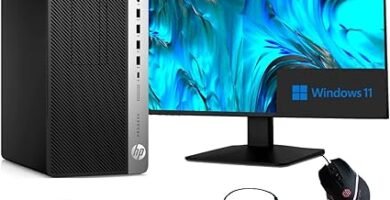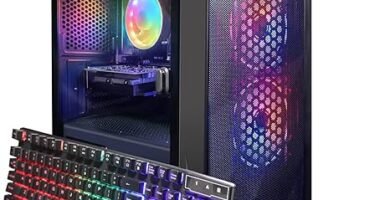
PC and Laptop: Which One Is Right for You?
When deciding between a PC (Desktop) and a Laptop, it’s essential to understand the core differences and how each device fits different user needs. Both offer advantages depending on what you prioritize—be it performance, portability, or price. In this article, we’ll explore the key features, benefits, and drawbacks of each to help you make an informed decision.
PC (Desktop) Overview
Desktops are stationary computers consisting of separate components like a tower, monitor, keyboard, and mouse. They are commonly used in office environments, gaming setups, and for tasks requiring heavy computing power such as video editing or 3D modeling.
Key Features:
- Customization: Desktops allow for easy upgrades. You can swap out individual components like the CPU, GPU, or RAM to improve performance or replace outdated parts.
- Power: Desktop PCs tend to have higher performance because they can house larger cooling systems and more powerful hardware.
- Cost-Effectiveness: You typically get more power per dollar with a desktop than with a laptop. Components like processors and graphics cards are often more powerful in desktops due to space and cooling.
- Ideal for Gaming and Professional Use: With powerful graphics processors and high-speed CPUs, desktops are favored by gamers and professionals who need maximum performance(Lenovo)
Drawbacks:
- Lack of Portability: Since desktops are stationary, they are best suited for those who don’t need to move their system.
- Space Requirements: Desktops take up more space, requiring a dedicated desk or workspace(Lenovo).
Laptop Overview
Laptops are portable, all-in-one devices that combine the screen, keyboard, and hardware into one unit. They are ideal for users who need to work or play on the go, whether in a café, office, or during travel.
Key Features:
- Portability: The biggest advantage of laptops is their portability. You can easily take your laptop anywhere, making them ideal for students, professionals, or frequent travelers.
- Built-in Battery: Laptops come with a built-in battery that allows for hours of use without needing to be plugged into a power source. Battery life varies by model, with some high-end laptops providing up to 12-15 hours of use on a single charge.
- Compact Design: Laptops take up significantly less space compared to desktops. They don’t require separate peripherals like monitors or keyboards, making them ideal for small workspaces or users who need a compact setup(Lenovo).
Drawbacks:
- Limited Upgradability: Unlike desktops, most laptops offer limited options for upgrades. While you can usually upgrade RAM and storage, components like the CPU and GPU are often soldered in place.
- Performance Constraints: Laptops generally offer lower performance compared to similarly priced desktops due to smaller size and cooling limitations. This makes them less suited for high-end gaming or heavy computing tasks(Lenovo).
Comparing Performance
- For Gamers: Desktops reign supreme. They can house more powerful graphics cards and CPUs, offering superior frame rates and smoother gaming experiences. Laptops can still offer solid gaming performance, but only in higher-end models such as gaming laptops from brands like Alienware or Asus ROG, which come with dedicated GPUs.
- For Professionals: If you need to run resource-heavy software for tasks like 3D rendering, video editing, or machine learning, a desktop will provide better performance and upgradeability over time. However, for professionals who need portability, laptops like the MacBook Pro or Dell XPS offer powerful processing capabilities with the added benefit of mobility(Lenovo).
Pros and Cons of Each
Desktops Pros:
- More powerful and easier to upgrade.
- Better suited for heavy tasks like gaming, video editing, or data processing.
- More customization options.
Desktops Cons:
- Not portable.
- Requires more space and additional peripherals like monitors and keyboards(Lenovo).
Laptop Pros:
- Highly portable, ideal for students or traveling professionals.
- All-in-one design, meaning no need for external peripherals.
- Can offer solid performance for everyday tasks and some creative work.
Laptop Cons:
- More expensive for the same performance level compared to desktops.
- Limited upgradability and less suited for high-performance gaming or editing(Lenovo).
Price Comparison
While laptops tend to be more expensive for the same level of performance, they offer greater convenience and portability. For instance, a gaming laptop may cost more than a desktop with similar specifications due to the compact design and built-in battery. On the other hand, building or purchasing a desktop PC will give you more power for your money, but you’ll also need to invest in peripherals like a monitor, keyboard, and mouse(Lenovo).
Conclusion
Choosing between a PC (desktop) and a laptop comes down to your specific needs. If you prioritize portability and need a device that can travel with you, a laptop is the better choice. However, if you need raw power, customization, or the ability to upgrade components over time, a desktop PC will provide better value and performance.
For most users, a laptop offers enough power for everyday tasks, with the added benefit of mobility. But for gamers, creators, or professionals who need high-end performance, a desktop remains the best option for delivering superior performance at a lower cost.

Skytech Nebula Gaming PC

How to Improve Your PC’s

Tips to Keep Your PC

How to Choose the Perfect PC

Laptops
- 【High Speed RAM And Enormous Space】32GB high-bandwidth RAM to smoothly run multiple applications and browser tabs all at…
- 【Processor】Intel Core i7-12700K Processor (12 Cores, 20 Threads, 25MB L3 Cache, Base Frequency at 2.7 GHz, Up to 5.0 GHz…
- 【Tech Specs】Front Ports: 1 x Power on, 1 x Microphone, 1 x Headphone / mic combo, 1 x SD card reader, 1 x USB-C 3.2 Gen …
